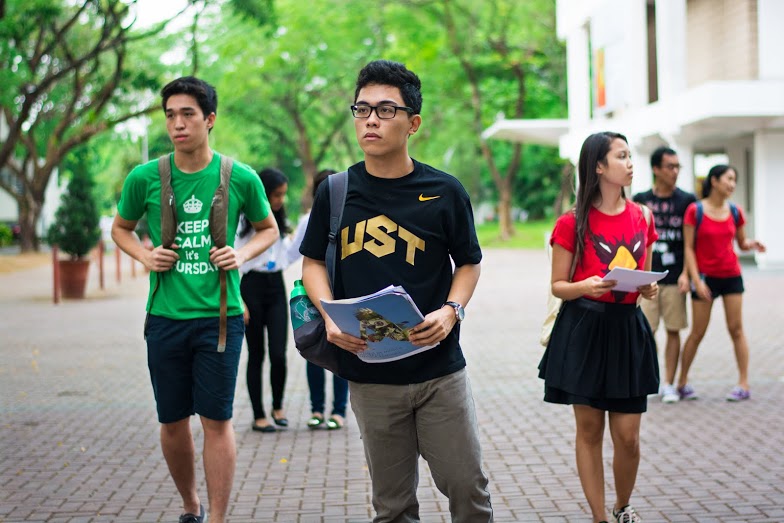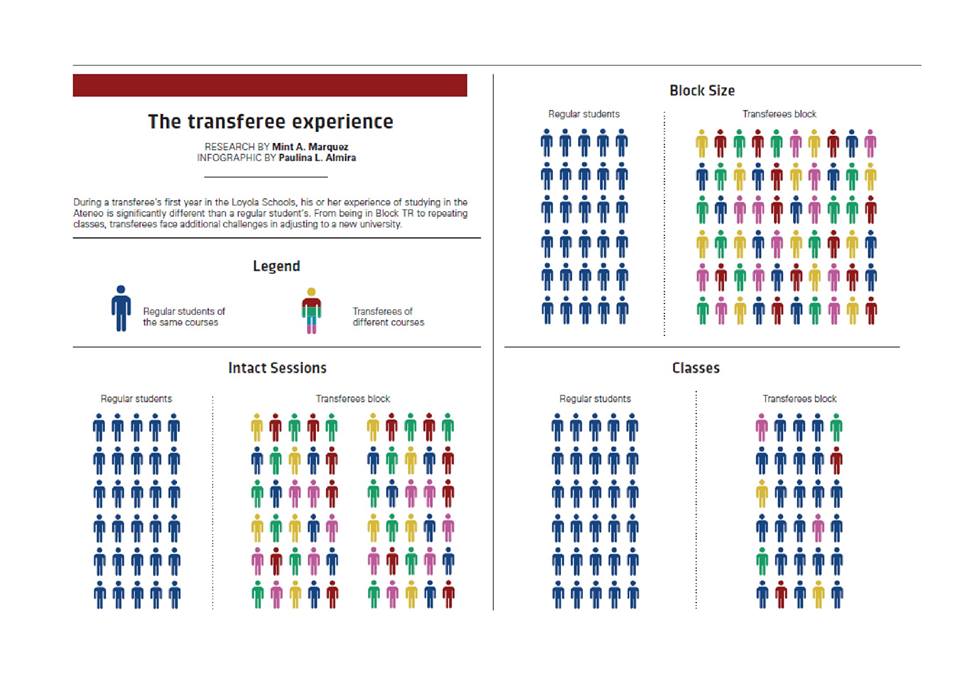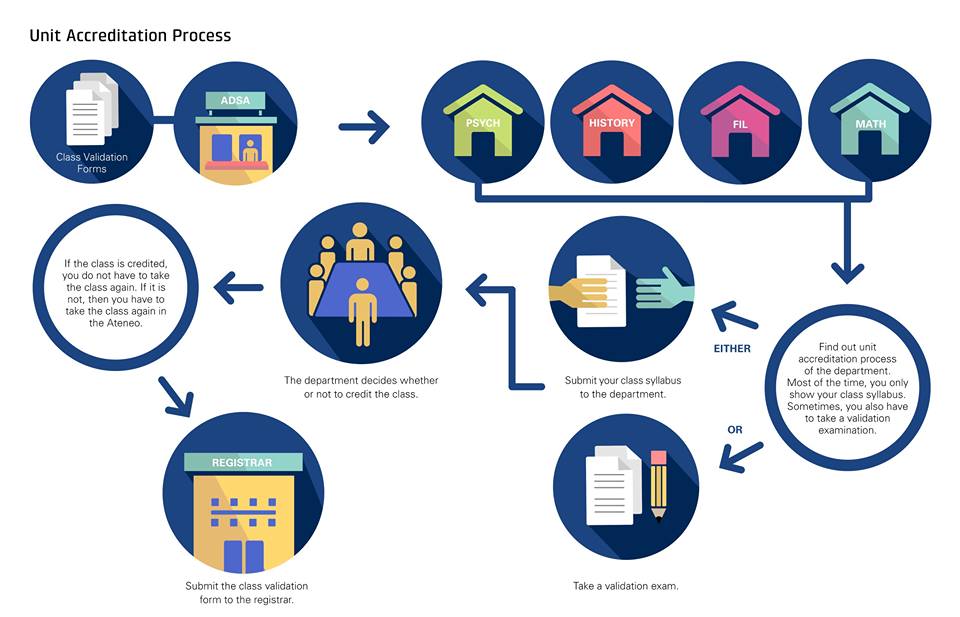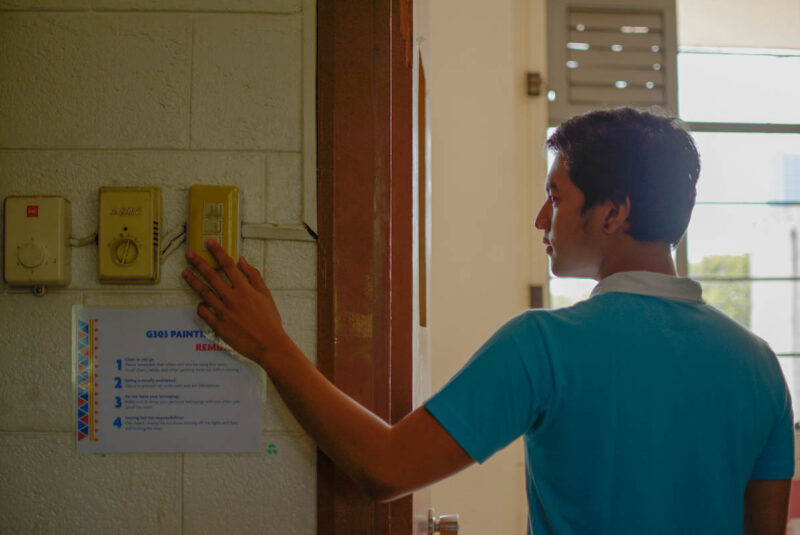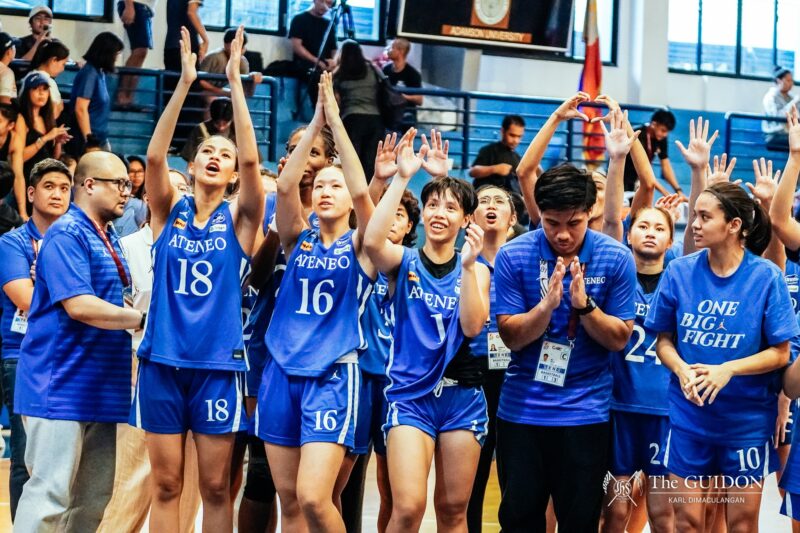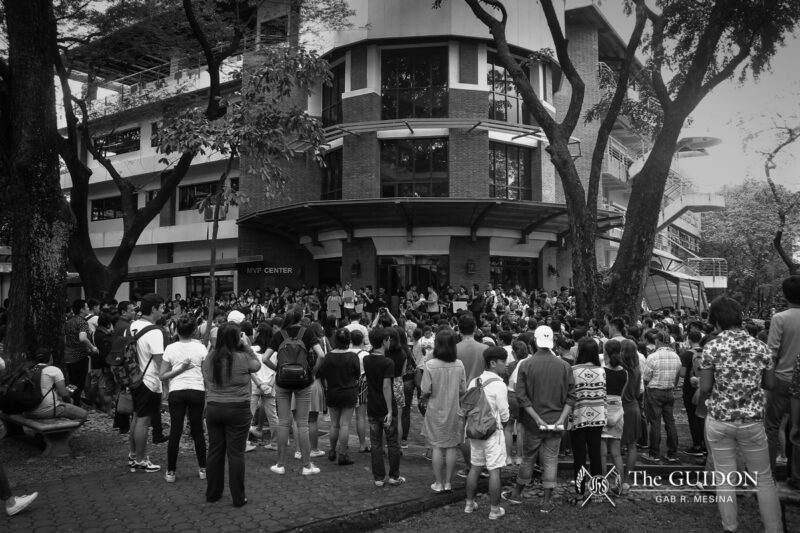A certain group of students in the Ateneo took the Ateneo College Entrance Test (ACET) twice, the maximum times one may take it. For them, acceptance into the Loyola Schools (LS) did not come in envelopes mailed to their homes. Months after the ACET, they come in text messages.
“Somebody texted me to call [the Office of Admission and Aid so I could find out] whether or not I passed,” recalls Anthea Patricio, health sciences sophomore.
She is a transferee from De La Salle University and, in her year, 57 other people have the same story. Kim del Rosario, management economics sophomore and another transferee from La Salle, even says that she was only given a day to decide whether or not she was going to confirm her slot.
Management junior Luigi Puno transferred to the Ateneo in November 2011. He says he was first called a non-diploma student. “My [identification card] had no year level and no course, so I was here just to take units to fulfill core [classes] so I wouldn’t waste time,” he adds.
It was not a warm welcome for the transferees—and the Ateneo was hardly any more accommodating from there.
Units of measure
Usually, a transferee would be in his or her second year of university upon entering the Ateneo, having spent their freshman year taking classes at the collegiate level elsewhere.
Section IV of the Undergraduate Student Handbook 2012 Edition states that transferees may have units earned in their previous universities credited in the Ateneo if the department chairperson concerned validates the class. There are two conditions: That the student validates his or her classes within the first semester of their stay in the Ateneo and that “not more than one-third of the units earned in the previous college may be validated.”
However, many transferees will have only a smaller fraction of their classes validated.
For Patricio, that fraction included only co-curricular subjects: Three physical education (PE) classes and National Service Training Program (NSTP). Del Rosario also had these classes and an additional unit of the laboratory component of Natural Science validated.
Mikee Serafica, management sophomore and transferee from University of Santo Tomas, was luckier. She had two PE classes, two Natural Science lecture classes, Modern Mathematics I (Ma 11) and a free elective validated.
Justin Chua, management junior and transferee from La Salle, succeeded in validating one-third of the units he had taken. However, the 15 units of engineering mathematics he took were all only credited to Math 11.
Worse still is Puno’s case. He transferred from the University of Massachusetts and only had Basic Information Technology Applications in Business (ITM 11)—a zero unit class—validated.
The validation process starts with the concerned department reviewing the syllabus of the class taken during the transferee’s previous enrollment. This serves for comparative purposes: To see what the student has already taken up and if the syllabus is equivalent to that of the Ateneo. This part of the process—reviewing the class syllabus—is standard across all departments of the LS.
Filipino Department Chair Joseph Salazar says the transferee should have been graded at least B in the class. He adds, “[Sining ng Pakikipagtalastasan sa Filipino I (Fil 11)] is difficult to validate because not a lot of schools offer the same program that combines Filipino literature with a cultural and multi-disciplinary component.”
Salazar says the Filipino Department already gives a diagnostic examination that all freshmen have to take and that “administering additional exams to credit subjects from another university will only lead to the loss of more valuable instruction time.”
An application of syllabi
However, for some departments, a syllabus is not telling enough of a transferee’s knowledge on the subject. These departments then add another step in the unit accreditation process: Validation exams.
One such department is the English Department. Associate Chair DM Reyes explains, “There has to be a follow-up—meaning to say, what is written [in the syllabus] must really be manifested by the students. We need a written exam. [It] consists of two parts: First, it is objective, and then, second, a part devoted to essay writing, to the development of essayistic thought, so to speak.”
He also mentions that Introduction to Fiction (Lit 13) and Introduction to Poetry and Drama (Lit 14) are difficult to validate because they are specialized classes on genre and are unique to the Ateneo. Other universities would only offer Introduction to Literature and genre classes would only be for Literature majors.
The Psychology Department also chooses to gauge a student’s knowledge through his or her performance on the validation examination. Officer-in-Charge Ma. Elizabeth Macapagal says that the validation examination that the department administers is usually “the final exam of [General Psychology (Psy 101)].” It covers seven to nine chapters of Ciccarelli and White’s Psychology (2011) and transferees are only given a week to study for it, regardless of when the subject was taken in the transferee’s previous enrollment.
Macapagal also says that the department is only following LS policy. However, there is no provision in the handbook about this process.
For Chua, this process is unfair. “We already took the subject—what’s there to prove?” he asks.
He also questions the value of being tested on certain subjects before they get validated, saying that the relevance of the class to a transferee’s course should be considered in the deliberation for class validation.
[blockquote author=”Justin Chua, Transferee, III BS MGT” pull=”pullright”]”We already took the subject- what is there to prove?”[/blockquote]“I think it’s kind of unfair that I came from an engineering course [and] I’m going to a management course… and I took Math 19 again. It’s just the same. It’s just the same as the math I took in engineering. It was even somehow easier,” he says.
Puno echoes these thoughts. He had to repeat classes he had already taken in the States and he felt that he did not learn anything new from them.
Del Rosario finds it unfair that her Introduction to Environmental Science (ES 10) class was not validated when she really did take the class at her previous school. However, she says that she was thankful that she took the Ateneo equivalent of La Salle’s college algebra because if she hadn’t taken Ma 11, she would have had a harder time in Calculus for Economists (Ma 20).
Blocked from blocks
Challenges for transferees do not end with the validation of classes. Because each transferee gets different classes validated, it is hard to find another student with the exact same Individual Program of Study (IPS). It is difficult, then, for transferees to have classes together.
Transferees get put into Block TR, a melting pot of students from different universities coming into the Ateneo to pursue different disciplines.
For Serafica, the hardest part of being a transferee is precisely that. “Yes, there’s Block TR but there really isn’t a block that you can rely on when you ask about projects or homework,” she says in a mix of English and Filipino. Similarly, Patricio feels she cannot participate in course-related activities because she is not in a block of health science majors.
Del Rosario shares that having a block with so many students has its downsides. It means that you can never really get to know everyone.
On the other hand, Chua thinks being in Block TR was a good thing, saying that it allowed him to bond with students from other schools.
Serafica says that there were times when it would only be one or two transferees in a class of another block. “Noong first sem, super out-of-place [ako] tapos parang ‘grabe, mag-isa ako’ (During my first semester, I felt really out-of-place and I would think, ‘Wow, I’m alone,’)” she adds.
Chua says that Block TR gets dissolved after the students’ first year in the LS. The students get distributed to blocks of their respective courses.
He says, “Honestly, for me, I’d prefer to stick with the block immediately—to the management block. [The office concerned] should distribute us to the different blocks instead [of keeping all of us in Block TR].”
Class experience
Block TR does not have any classes together except Introduction to Ateneo Culture and Traditions (Intact) and Fil 11, although their block will most probably be halved for those classes. Some transferees may even be in other sections entirely. For other subjects in the core curriculum, transferees often do not get pre-enlisted, even for English and Literature blocks.
Because transferees do not have a common IPS on Ateneo Integrated Student Information System (Aisis), it would be difficult to pre-enlist them in certain subjects in the core curriculum. It would be logistically easier if transferees just enlisted themselves, making them join classes of other blocks.
Serafica enjoys this freedom because she is free to make her own schedule and choose her own professors. On the other hand, Puno says that one of the most difficult things that comes with being a transferee is having problems with Aisis.
He explains that on Aisis, transferees would be listed as freshmen during their first year in the Ateneo. Because some classes in the core curriculum have already been credited, they would be taking subjects like Psy 101 or even the Philosophy subjects—subjects that freshmen do not take—in their first year. Transferees have to wait until the upperclassmen finish enlisting in order to take their turn.
“You probably won’t get a section or you’ll get a 7:30 AM class and then a 6:00 to 9:00 PM class with professors who aren’t the ones you really want,” he says.
Puno observes that transferees are older and more mature than the incoming freshmen. “Most of us are older, so I don’t think we need things like Intact and [the Freshmen Orientation Seminar],” he says.
Compromises
Recall: Finding out you got accepted into the Ateneo.
Patricio says she was “grateful because not everyone is given the chance to study in Ateneo.”
“[I felt] really, really happy because this was my dream school,” says Serafica.
Do you regret transferring?
Even after repeating classes and experiencing countless enlistment problems, Chua answers, “I think I don’t. I don’t really.”
Editor’s Note: Inquiry Editor Mint A. Marquez is a transferee.

